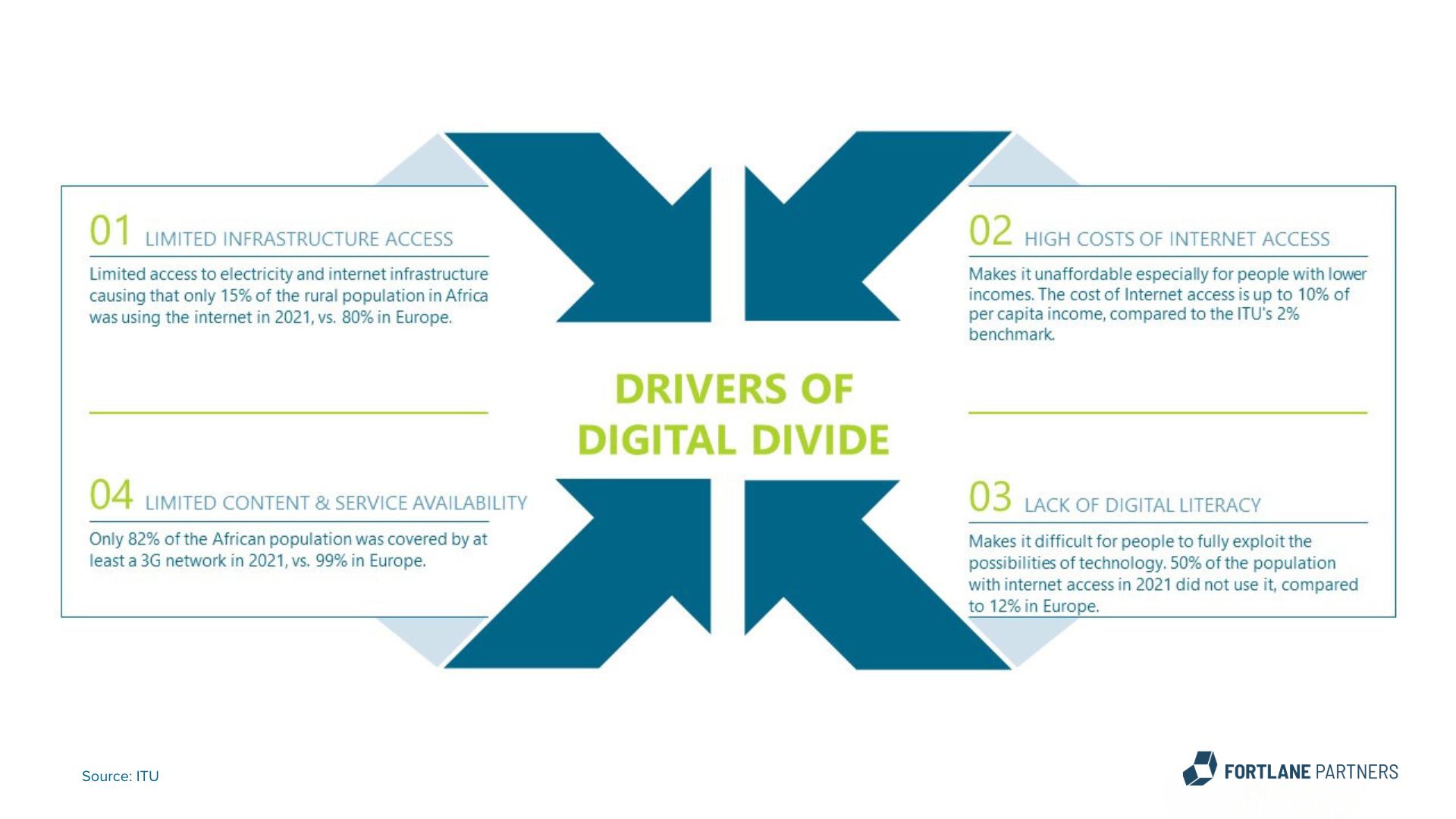Digital divide: call for building digital bridges in Africa
The digital divide is one of the biggest problems facing global society. It highlights the global inequalities in access to digital services across all sectors and social levels.
In this article I want to discuss the lack of availability of digital infrastructure for millions of people in developing countries, using Africa as an example. I am going to address diverse sectors and fields, look at current problems that are caused by the digital divide, and consider how these problems have become a governmental topic for Africa itself. Lastly, I will present the benefits that potential solutions could have for the population and the government itself.

Scroll down
What is the digital divide?
Global inequality also extends to digitalization. The “digital divide” refers to the unequal access to digital technology, despite digital technologies promising to be more inclusive than the analogous world. The digital divide is the gap between individuals, businesses, and geographic areas which have access to information and communication technologies (ICT) and those that don’t. Often, factors such as income and location considerably influence this gap.
What is the situation in Africa? It shouldn’t be surprising that the digital divide is particularly pronounced on the African continent, where only around 40% of the population has access to the internet. This compares to around 88% internet penetration in North America and Europe according to the International Telecommunication Union (ITU). In rural or less developed areas, this gap is even more noticeable, where as little as 20% of the population has access to ICT. This inequality of Africa toward the rest of the world forms a major barrier to socioeconomic development with severe implications on the African people.
Limited access to education and job opportunities, inhibited growth of small businesses, and impeded access to essential services such as healthcare are only some of the results of the digital divide. This inequality has become even more pronounced during the global pandemic, where those without internet access have been unable to profit from remote education, work, or health services.
What factors contribute to the African digital divide?
But what is the cause of this situation, especially in times where internet-capable devices and bandwidth are supposedly so cheap in the perception of the Western world? The crux is that it’s not like that in Africa.
There are various factors that contribute to the African digital divide:

What role should telecommunications companies play here?
The telecommunications industry must play an active role in improving this situation. Since political stability cannot always be taken for granted as known in the developed world, bridging Africa’s digital divide is very unlikely to be achieved by the public sector alone. Key to success is cooperation between the different stakeholders, as overcoming the digital divide will be a win-win for all actors. Governments must provide the necessary regulatory and policy environment to enable companies to invest in infrastructure and offer services and required devices at affordable prices. Meanwhile, the private sector must leverage its expertise and resources to implement networks, connectivity, and devices in scale.
With improved internet and device affordability, subscriber numbers are expected to increase. Consequently, operators can increase supply and reduce prices further by deploying newer and more cost-efficient technologies that eventually improve living standards and leverage user demand further.
In addition to initiatives directly related to their core business model, telco companies can also contribute with broader initiatives. Offering educational content through their networks, providing digital literacy and training programs to help people learn how to use mobile technology, or even giving local small businesses tools to improve their digital footprint can all help to reduce the digital divide.
However, to avoid creating new problems by solving old ones, it’s of utmost importance to pay attention to inclusivity and to address the digital divide holistically. This includes targeting specific groups such as women, youth, and people with disabilities who are often disproportionately affected by the digital divide. Further, collaboration between public and private bodies can also help to ensure that digital infrastructure and services are designed and implemented in a way that meets the specific needs of local communities.
Summary
How could Africa profit from bridging the digital divide? If the digital divide is eventually reduced in Africa, widespread improvements in the lives of the African people are in sight. More people will have access to education and healthcare, which can help to reduce poverty and ensure a better quality of life.
More people contributing to the digital economy generates economic growth, job creation, and improved access to services. Digital financial services enhance financial inclusion and will introduce the services of financial institutions to many people for the first time. Also, it’s unquestionable that public services are more effective the more accessible they are, particularly in rural areas. Overall, closing the digital divide in Africa is vital for the socioeconomic development of the entire continent. But telecom providers have to play a key role in achieving this.
KontaktSprechen Sie uns an



